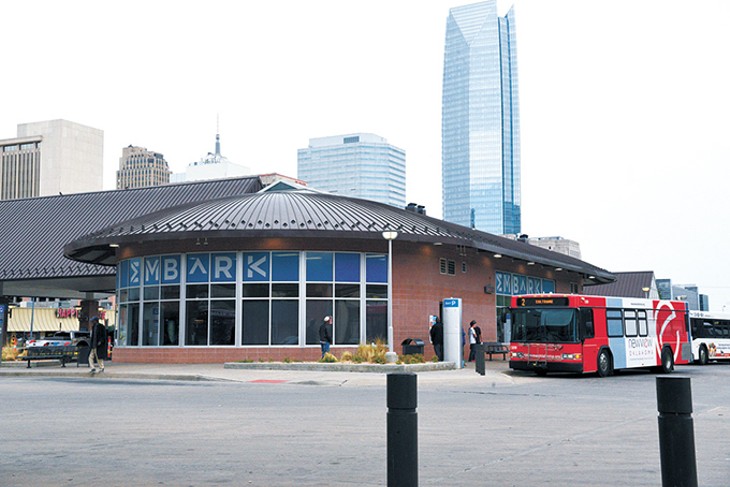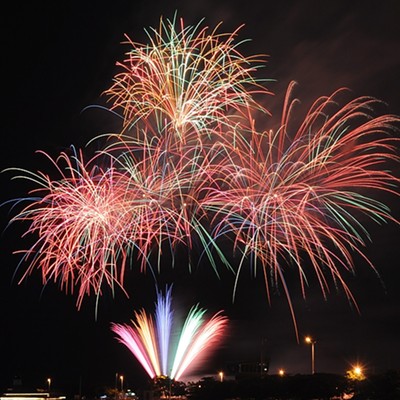
About seven years ago, Oklahoma City Councilman David Greenwell was appointed to the Central Oklahoma Transportation & Parking Authority (COTPA) board, which provides oversight to the city’s parking and transportation system. Greenwell became the first council member to serve on the board in a number of decades, if not the very first. The councilman provided a unique link between public transit conversations and council horseshoe discussions and decisions. The appointment also motivated the longtime south Oklahoma City resident to ride the city’s bus service.
“That action alone has helped the city council become better aware of public transit,” Greenwell said.
A lot can be said about Oklahoma City’s public transit agency since 2011. In 2014, the bus system not only switched names from Metro Transit to Embark, but riders enjoyed systemwide service enhancements, including new schedules and route alignments. On most routes, buses began arriving every half-hour. With a goal to continue to increase bus service, a year later, Embark launched nighttime bus service on two routes. For the first time since 1979, buses traveled along Oklahoma City streets past 9 p.m. largely to aid the growth of the city’s service economy.
In the last few years, Embark has continued to revamp its bus routes to focus on frequent, reliable services to major employers, educational facilities and dense neighborhoods. It has focused on addressing the needs of the riders, from outfitting buses with Wi-Fi and doubling the number of covered bus shelters to offering free ridership to high school seniors and juniors.
There was nothing easy about making these changes, which took much discussion, time and funding.
Now, COTPA and the council are eyeing the next major step in improving the city’s bus system: Sunday service.
“Most of the riders on Embark depend upon Embark for work purposes,” said Greenwell, who frequents the bus as a method for traveling downtown. “Occasionally, I will ride on Saturdays, and that’s when you can really tell how people depend on Embark. You will see people coming on the bus with groceries or other shopping bags. It solidifies that understanding that people depend on Embark as their only form of transportation.”
Sunday bus service will be life-changing for Embark customers, especially for those who previously struggled with transportation on Sundays to get to and from work, said James Cooper, who also serves on the COTPA board.
“If you really want to make sure people have access to employment in this city — that state’s capital city — seven-day-a-week [bus service] must be offered at a minimum,” Cooper said.
Budget proposed
Last week, the Oklahoma City Council took its first glance at the city’s proposed budget for the 2018-19 fiscal year. The total proposed budget is $1.56 billion with $460 million dedicated to the general fund, which acts as a catchall fund for day-to-day city operations. With sales tax dollars as the main source of revenue for the general fund, there is a 10.8 percent increase from the previous year due in large part to the permanent 1/4 cent sales tax approved by voters last September.
Of the significant changes in the proposed budget, several are connected to the city’s public transit system. The city has budgeted $3.1 million for the operation of the Oklahoma City Streetcar, which is expected to begin operations in December. About $122,000 is earmarked for beginning night service on Embark’s Route 22, which runs from downtown across NE Fourth Street to N. Martin Luther King Avenue with stops at Douglass Mid-High School, Ralph Ellison Library, Metro Tech Springlake campus and through the Adventure District.
Then, there is Sunday bus service.
“The proposed budget includes $931,000 of funding to establish Sunday service,” said Jason Ferbrache, the transit system’s director, addressing the council on May 1. “We will now have — with the approval of the budget — service seven days a week in Oklahoma City. I am proud to report that the Sunday service we are seeking to establish is consistent with what we are already doing on Saturday.”
Sunday service would be offered on 17 Embark bus routes with the buses arriving at stops once every hour. Buses would run for 11.5 hours. Embark proposes beginning Sunday service in January or February of 2019, which coincides with the time of year Embark typically debuts service enhancements.
The council is scheduled to vote on the proposed budget June 5.
Room for more
Much more is expected to come from public transit, said Cooper, who was appointed to the COTPA board in 2015.
“The question has to be, ‘How do we build on our recent successes?’” Cooper said. “That really has to be the question. So you take the streetcar and you ask, ‘How can our current bus system feed better into the downtown streetcar system? How do you improve the existing bus service to make sure someone who lives in Capitol Hill or Prairie Queen neighborhood can take the bus to get downtown and move around on the streetcar?’”
Those questions are already being asked. One result is the realignment of Route 50, the Downtown Discovery route. By rerouting the service, buses will make stops around the new residential housing to connect residents with downtown destinations and streetcar stops.
The next big step for Embark is bus rapid transit, which is popping up in major cities across the county. With bus rapid transit, or BRT systems, buses travel on separated lanes and are hooked up to the local traffic light grid. They stop less frequently and take riders to their destinations quickly.
Both Cooper and Greenwell said a BRT system is coming. The city’s comprehensive plan, planokc, lists BRT as a type of transit planned for four corridors: Reno Avenue, Northwest Expressway, 59th Street and Meridian Avenue.
In Oklahoma City — a longtime car-centric city — attitudes are changing toward public transportation, Cooper said.
“When we talk about investing in public transportation, we are really talking about, ‘Do voters support it?’” said Cooper.
Oklahoma City voters have a recent history of supporting transit from the 2007 general obligation bond program that plugged $7.8 million into a bus fleet to the 2009 vote on MAPS 3 that featured the streetcar. Most recently, more than 60 percent of voters approved the transit proposition for $20 million during the September election for the 2017 General Obligation Bond program.
Around the council horseshoe, awareness and support of public transportation are strong. Greenwell said the council wants to see the same from its citizens, who are the key to further expansions.
“The only future limitation on expansion and enhancement of our public transportation lies with the citizens of Oklahoma City,” Greenwell said. “If they would utilize it more, it will continue to be enhanced and expanded.”












